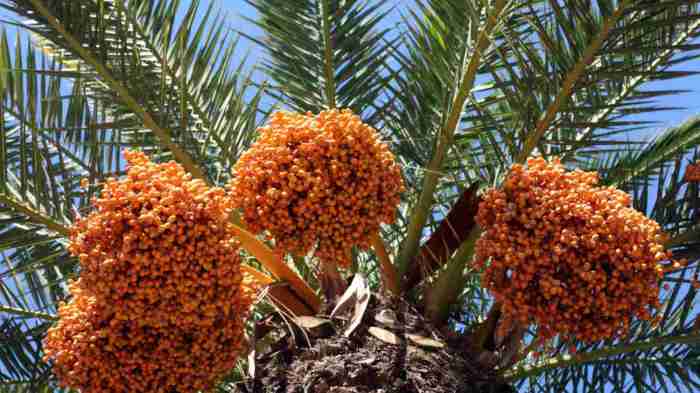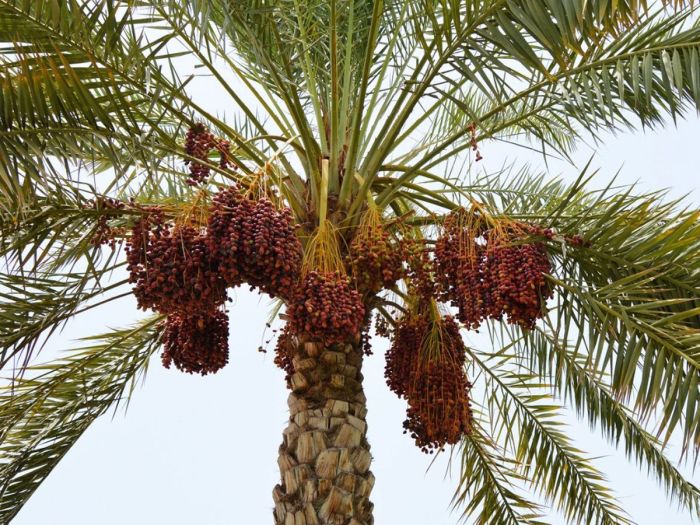Can You Plant Date Seeds?
Growing Date Palms from Seed
Can you plant date seeds – Cultivating date palms from seed can be a rewarding, albeit lengthy, process. This guide provides a comprehensive overview of the germination process, suitable growing conditions, potential challenges, and long-term care required to successfully nurture a date palm from seed to maturity. Remember that patience and consistent attention are key to success.
Date Seed Germination Process, Can you plant date seeds
The germination of date seeds involves several distinct stages, each requiring specific environmental conditions. Successful germination hinges on proper seed preparation and consistent monitoring.
- Seed Preparation: Begin by selecting plump, healthy seeds. Clean them thoroughly, removing any remaining pulp. Scarification, a process of weakening the seed coat (e.g., by gently filing or soaking in warm water for 24-48 hours), can significantly improve germination rates.
- Planting Methods: Two primary methods exist: direct sowing into the ground (suitable for warmer climates) and starting indoors (recommended for colder climates or to enhance germination control). Direct sowing involves planting seeds directly into well-drained soil, while indoor starting utilizes seed trays or pots with a suitable germination mix.
- Environmental Conditions: Consistent warmth (ideally 25-30°C or 77-86°F) and high humidity are crucial for successful germination. Maintain consistently moist soil, avoiding waterlogging. Adequate sunlight is important once seedlings emerge.
- Germination Stages: Germination typically takes several weeks to several months, depending on seed viability and environmental conditions. Initially, a root emerges, followed by the shoot. Once the seedling has developed a few true leaves, it’s ready for transplanting.
| Germination Method | Success Rate (Estimate) | Advantages | Disadvantages |
|---|---|---|---|
| Direct Sowing | 50-70% | Simple, less handling | Dependent on environmental conditions, higher risk of failure |
| Indoor Starting | 70-80% | Greater control over environment, higher germination rate | More labor-intensive, requires transplanting |
| Soaking (pre-treatment) | 60-75% | Improves germination rate | Requires additional time and attention |
| Scarification (pre-treatment) | 75-85% | Significantly improves germination rate | Requires care to avoid damaging the embryo |
Suitable Growing Conditions for Date Palms
Providing the right environment is crucial for healthy date palm growth. This includes factors like temperature, sunlight, humidity, soil, and nutrition.
An infographic illustrating these conditions would show a sun-drenched landscape with well-drained soil, highlighting the optimal temperature range (20-35°C or 68-95°F), high sunlight exposure (at least 6-8 hours daily), and moderate humidity levels. It would also depict the ideal soil composition (sandy loam with good drainage) and the importance of regular fertilization with a balanced nutrient-rich fertilizer.
Challenges and Troubleshooting
Several issues can hinder date palm growth. Understanding these problems and their solutions is key to successful cultivation.
- Fungal Diseases: Good drainage and air circulation prevent fungal issues. Treat affected areas with appropriate fungicides.
- Pest Infestations: Regular inspection and treatment with suitable insecticides can control pests.
- Improper Watering: Avoid both overwatering and underwatering. Maintain consistently moist but well-drained soil.
- Slow Growth/Lack of Germination: Check for seed viability, ensure proper environmental conditions, and consider scarification or other pre-treatment methods.
Long-Term Care and Maintenance

Source: planetnatural.com
Ongoing care ensures healthy date palm development. This involves regular watering, fertilization, and occasional pruning.
A timeline might show: Year 1 – Seed germination and seedling establishment; Year 2-5 – Gradual growth, transplanting into larger containers; Year 5-10 – Continued growth, potential for fruiting; Year 10+ – Mature tree, regular pruning and fertilization.
Variety Selection and Seed Sourcing

Source: futurecdn.net
Choosing the right date palm variety and obtaining high-quality seeds are essential for success. Several factors influence seed quality and viability.
Reliable sources include reputable nurseries or online sellers specializing in date palm seeds. Assess seed viability by checking for plumpness and lack of damage. Different varieties offer varying levels of cold hardiness and fruit production; research your local climate to select suitable varieties.
FAQs: Can You Plant Date Seeds
How long does it take for a date seed to germinate?
Germination time varies greatly, from a few weeks to several months, depending on seed viability, preparation methods, and environmental conditions.
Can I use any type of date seed?
While most date seeds are viable, selecting seeds from fresh, high-quality dates increases your chances of success. Consider the date variety’s suitability for your climate.
What should I do if my date seed doesn’t germinate?
Check for proper seed preparation, appropriate environmental conditions, and rule out potential problems like fungal infections. Try different germination methods.
How often should I water my date palm seedling?
Yes, you can plant date seeds, though germination can be tricky. The process shares some similarities with preserving other seeds for planting, such as the careful drying involved. For instance, understanding the principles outlined in this guide on how to preserve pumpkin seeds for planting can offer valuable insights into seed preservation techniques applicable to date seeds as well.
Successfully planting date seeds requires patience and attention to detail, mirroring the care needed for pumpkin seeds.
Water regularly, keeping the soil consistently moist but not waterlogged. Adjust watering frequency based on climate and soil conditions.




















